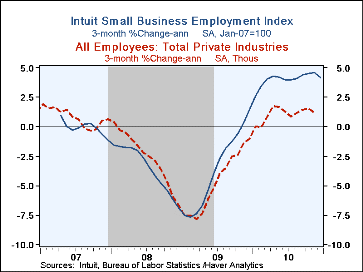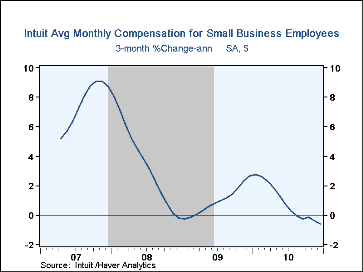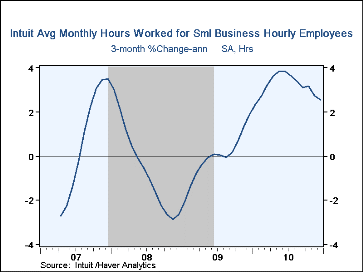 Global| Jan 05 2011
Global| Jan 05 2011Small Business Employment Outpaces Overall Economy
by:Tom Moeller
|in:Economy in Brief
Summary
Small business employment has been growing since September, 2009. That's the indication from Intuit's Small Business Employment Index for December. Since the 2009 low, the index has risen 4.5% and that compares to roughly 0.5% growth [...]
 Small business employment has been growing since
September, 2009. That's the indication from Intuit's Small Business
Employment Index for December. Since the 2009 low, the index has risen 4.5% and
that compares to roughly 0.5% growth in overall nonfarm payrolls. The Intuit Small Business Employment Index is based on
online employment data from small business employers (each with fewer than 20 employees) that use Intuit Online Payroll. These smallest
employers comprise about 88 percent of the total U.S. private employer base and employ nearly 20 million people.
Small business employment has been growing since
September, 2009. That's the indication from Intuit's Small Business
Employment Index for December. Since the 2009 low, the index has risen 4.5% and
that compares to roughly 0.5% growth in overall nonfarm payrolls. The Intuit Small Business Employment Index is based on
online employment data from small business employers (each with fewer than 20 employees) that use Intuit Online Payroll. These smallest
employers comprise about 88 percent of the total U.S. private employer base and employ nearly 20 million people.
Despite the improvement in jobs, Intuit's measure of compensation growth has decelerated to -0.6% (AR) over a three-month period from 2.8% at the beginning of last year. Small Business Employee Monthly Compensation includes the compensation paid by small business owners to themselves. The employees at small businesses have seen their monthly hours worked grow 3.7% from the 2009 low. The Intuit Small Business Figures are available in Haver's USECON database.
The minutes to the latest FOMC meeting can be found here.
| Intuit Small Business Employment(SA) | Dec | Nov | Oct | Y/Y | 2010 | 2009 | 2008 |
|---|---|---|---|---|---|---|---|
| Employment Index (Jan-07=100) | 97.03 | 96.76 | 96.41 | 4.1% | 95.23 | 93.48 | 98.33 |
| Equivalent Jobs (000s) | 20,485 | 20,428 | 20,354 | 4.1 | 20,105 | 19,734 | 20,758 |
| Avg. Monthly Compensation ($) | 2,606.7 | 2,609.0 | 2,611.3 | 0.5 | 2,608.7 | 2,571.0 | 2,546.3 |
| Avg. Monthly Hours Worked (Hours) | 107.5 | 107.3 | 107.1 | 3.2 | 106.0 | 103.7 | 104.8 |
Tom Moeller
AuthorMore in Author Profile »Prior to joining Haver Analytics in 2000, Mr. Moeller worked as the Economist at Chancellor Capital Management from 1985 to 1999. There, he developed comprehensive economic forecasts and interpreted economic data for equity and fixed income portfolio managers. Also at Chancellor, Mr. Moeller worked as an equity analyst and was responsible for researching and rating companies in the economically sensitive automobile and housing industries for investment in Chancellor’s equity portfolio. Prior to joining Chancellor, Mr. Moeller was an Economist at Citibank from 1979 to 1984. He also analyzed pricing behavior in the metals industry for the Council on Wage and Price Stability in Washington, D.C. In 1999, Mr. Moeller received the award for most accurate forecast from the Forecasters' Club of New York. From 1990 to 1992 he was President of the New York Association for Business Economists. Mr. Moeller earned an M.B.A. in Finance from Fordham University, where he graduated in 1987. He holds a Bachelor of Arts in Economics from George Washington University.
More Economy in Brief
 Global| Feb 05 2026
Global| Feb 05 2026Charts of the Week: Balanced Policy, Resilient Data and AI Narratives
by:Andrew Cates








